28 Oct

In today’s fast-paced and competitive markets, staying ahead isn’t just a luxury—it’s a necessity. However, keeping tabs on every move your competitors make can be overwhelming. This is where competitive intelligence (CI) plays a crucial role. CI involves tracking your competitors’ strategies, pricing models, and trends to gain insights that allow you to make informed business decisions.
With the advent of AI, companies are now exploring automated solutions to handle competitive monitoring. However, it’s worth exploring how AI enhances competitive intelligence by streamlining tasks, but also consider the key limitations businesses need to consider before relying solely on AI-driven solutions. In short, companies should consider AI an enhancer for competitive intelligence monitoring – but not a true solution.
What are the biggest challenges of competitive intelligence monitoring in 2024?
Competitive intelligence can provide significant strategic advantages, but it comes with challenges. Here are the most common pain points businesses encounter:
Monitoring Many Data Sources: Companies often need to track hundreds of competitor sites to monitor product prices, new service launches, and promotional offers. Keeping up with these updates manually can quickly become unmanageable.
Data Overload: The amount of information collected from competitors is vast. Without proper tools or automation, businesses may struggle to extract actionable insights from these large datasets.
High Costs of Monitoring Tools: Competitive monitoring software can be expensive, especially for smaller businesses with limited budgets.
Limited Human Capacity: Tracking multiple competitors requires significant manpower. Even with a well-trained team, it’s hard to react in real-time to competitor changes without some automation.
What are the biggest benefits of using AI for competitive monitoring?
AI offers several advantages that help businesses overcome the challenges of traditional competitive intelligence methods:
Automated Data Collection – AI can scrape competitor websites, news articles, and public databases simultaneously, eliminating the need for manual data gathering.
Speed and Efficiency – AI-powered tools process large amounts of data quickly, spotting trends or opportunities faster than human analysts.
Cost Savings – AI reduces the dependency on large monitoring teams and lowers the need for expensive software, making competitive intelligence more accessible.
Predictive Insights – With the help of machine learning, AI tools analyze historical data to identify trends, allowing businesses to anticipate market movements.
Custom Alerts and Reports – AI-powered platforms offer automated alerts and reports, notifying companies when competitors introduce new products, change prices, or run promotions.
Risks of using AI for competitive intel
While AI offers numerous benefits, there are also significant challenges and risks involved:
Limited Reliance on Real-Time Data – AI models typically rely on historical datasets and pre-built algorithms, meaning they may not always reflect real-time market changes. Businesses risk acting on outdated insights.
Risk of AI Hallucinations – AI systems are prone to hallucinations—generating incorrect or misleading insights based on flawed data interpretation. Faulty competitive intelligence can lead to costly business decisions.
Inability to Track HTML or Structural Changes on Websites – Some valuable competitor information involves subtle changes, such as modifications in website layout or content updates. AI tools may not detect these changes effectively, missing out on important clues.
Data Quality Issues – AI tools are only as good as the data they receive. If the input data is incomplete, outdated, or biased, the outputs will be equally flawed, leading to incorrect conclusions.
Overdependence on AI Models – Relying too heavily on AI can cause companies to overlook qualitative insights—such as customer reviews or competitor intent—that are best interpreted by human analysts.
Ethical and Privacy Concerns – Automated scraping and data collection may raise compliance issues, especially when monitoring competitors’ websites. Missteps can lead to reputational damage or legal risks.
Best practices for integrating AI into competitive intelligence
To fully leverage AI while minimizing risks, consider the following best practices:
Use AI as a Supplement, Not a Replacement – While AI excels at automation, human expertise is still essential for interpreting complex data and providing nuanced insights.
Invest in Regular Model Updates – AI tools must be updated frequently to ensure relevance and accuracy, especially as market conditions evolve. This argues for potentially investing in and developing an in-house model if your technical team is capable.
Monitor and Validate AI Outputs – AI-generated insights should be cross-referenced with manual or traditional tracking methods to avoid errors or misleading conclusions.
Develop a Hybrid Monitoring Strategy – Combining AI tools with traditional web monitoring software offers a more comprehensive view of competitors and helps detect subtle market changes.
How ChangeTower can help with competitive monitoring
Here’s how ChangeTower can enhance your competitive intelligence strategy:
Real-Time Website Monitoring – ChangeTower tracks changes to web pages—including content, pricing, and HTML structure—ensuring businesses capture critical updates as they happen.
Detect Subtle Changes AI Might Miss – While AI excels at processing large datasets, it may struggle with nuanced updates, such as subtle HTML adjustments or new product descriptions. ChangeTower monitors these changes in real-time, giving you the complete picture.
Custom Alerts for Competitor Activity – Set up customized alerts to receive notifications when competitors make changes to their pricing, service offerings, or promotional campaigns. This allows you to act quickly and stay competitive.
Automated Reporting for Strategic Insights – With ChangeTower’s automated reporting, you can efficiently monitor multiple competitor websites without relying heavily on staff. AI models can be integrated alongside these reports for predictive insights, giving your team an edge.
Compliance-Friendly Web Monitoring – ChangeTower ensures your data collection practices align with legal and ethical standards, mitigating risks that could arise from improper AI-based scraping techniques.
Adam Hausman has worked with ChangeTower since its founding in 2018 and is passionate about the potential of website monitoring software in industries including SEO, compliance monitoring, competitive intelligence, and more. Also founder of Greenlight Growth Marketing, he holds degrees from Indiana University (BA English/Psychology 2008) and the University of Illinois-Chicago (M.Ed. Secondary Education 2012). He lives in Maine with his wife, 2 kids, and 2 annoying cats.
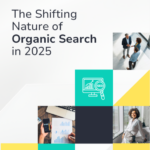
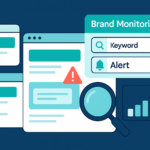
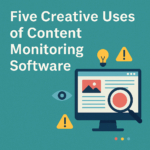
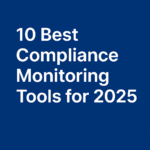
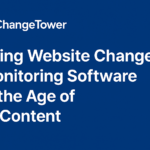
Adam Hausman